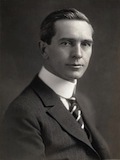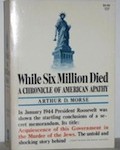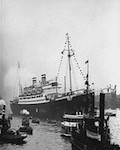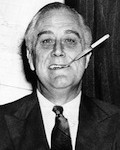As Assistant Secretary of State from 1940 to 1944, Samuel Breckinridge Long (1881-1958) was the senior official responsible for implementing the Roosevelt administration’s policies regarding European Jewry during the Holocaust years.
The son of wealthy Kentucky horse breeders, Long became friendly with Franklin D. Roosevelt when they both served in the Woodrow Wilson administration. Subsequently Long was a major donor to Roosevelt’s 1932 presidential campaign, and as a reward was appointed U.S. ambassador to Italy, where he served from 1933 to 1936.
Long’s dispatches to Washington from Rome praised the fascist Mussolini regime for its “well-paved” streets, “dapper” black-shirted stormtroopers, and “punctual trains.” Eleanor Roosevelt once remarked to the president about Long, “Franklin, you know he’s a fascist,” to which FDR, with “an unusually cross tone,” replied, “I’ve told you, Eleanor, you must not say that.”
Congressman Emanuel Celler (D-New York) characterized Long as “cold and austere, stiff as a poker, highly diplomatic in dress and in speech…[and] anti-Semitic.” Celler’s characterization is supported by entries in Long’s private diary. He described Hitler’s Mein Kampf as “eloquent in opposition to Jewry and Jews as exponents of Communism and chaos.” Long saw himself as besieged by “communists, extreme radicals, Jewish professional agitators, [and] refugee enthusiasts” who were “all woven together in the barrage of opposition against the State Department which makes me the bull’s eye.” In one 1940 diary entry, he complained that refugee sympathizers, who were “largely concentrated along the Atlantic seaboard, and principally around New York” had “joined up with the small element in this country which wants to push us into this war.”
INDEFINITE DELAYS
In early 1940, Roosevelt placed Long in the State Department, where he supervised twenty-three of its forty-two divisions, including the visa section. Soon after taking up his new post, Long outlined to his colleagues his strategy to “delay and effectively stop for a temporary period of indefinite length the number of immigrants into the United States.” The key, he explained, was “to put every obstacle in the way and to require additional evidence and to resort to various administrative devices which would postpone and postpone and postpone the granting of the visas.”
Long regularly briefed President Roosevelt on his efforts to suppress immigration below the level allowed by existing law. In one diary entry from October 1940, Long mentioned meeting with FDR to discuss “the whole subject of immigration, visas, safety of the United States, procedures to be followed,” and “I found that he was 100% in accord with my ideas.”
Long frequently clashed with refugee advocate James G. McDonald, chairman of the President’s Advisory Committee on Political Refugees, over issuing emergency visitors’ visas to refugee intellectuals, artists, and anti-Nazi activists. Long warned the president that McDonald was trying got exploit the visa program to admit individuals who “are not of the desirable element.” As evidence, he told FDR of a German woman who was asked to prove she would able to leave the U.S. after the expiration of her emergency visa. She showed a letter from a German official in Portugal stating she would be allowed to return to Germany. That, Long asserted, indicated she was either working for the Nazis or not in genuine danger.
On another occasion, Long blocked the granting of visas to 292 German Jewish refugees in England because he believed they had been pacifists during World War One. “They would have the same attitude about this country as was indicated in the last war,” Long explained to a colleague. “If this country is not worth fighting for, it is not worth coming to.”
“SOB STUFF”
After one of McDonald’s meetings with the president in 1940, FDR assured Long that he (Roosevelt) had admonished McDonald not to “pull any sob stuff” on him. After that exchange, Long wrote in his diary: “The President expressed himself as in entire accord with the policy which would exclude persons about whom there was any suspicion that they would be inimical to the welfare of the United States no matter who had vouchsafed for them. I left him with the satisfactory thought that he was wholeheartedly in support of the policy which would resolve in favor of the United States any doubts about admissibility of any individual.”
Long also lobbied the president against attempts by refugee advocates, in 1940-1941, to open U.S. territories such as Alaska or the Virgin Islands to settlement by European Jews. Long persuaded the military authorities to declare the Virgin Islands a closed military zone that it would be legally impossible for refugees to enter.
In June 1941, at Long’s initiative, the administration adopted a stringent new policy of rejecting all visa applicants who had close relatives in German-occupied territory. The new edict affected significant numbers of European Jews.
Detailed information about the mass murder of Jews in Europe began reaching the State Department, from U.S. diplomats in Switzerland, in mid-1942. Long and his colleagues did their best to prevent the information from reaching American Jewish leaders and the press. When those efforts failed, they instructed the U.S. legation in Bern to stop forwarding atrocity reports to Washington. This suppression of the news was uncovered by Treasury Department officials in mid-1943, when they began investigating the reasons behind the State Department’s foot-dragging in approving a license for the World Jewish Congress to send funds to Europe to ransom and shelter Jewish refugees.
When Treasury aides asked Long to provide copies of State’s correspondence on these issues, Long doctored one of the telegrams to hide State’s instruction to Bern to stop sending atrocity information. Long’s tampering with the document was uncovered by the Treasury staff, setting the stage for a major conflict between the two departments over the refugee issue at the end of 1943.
LONG’S TESTIMONY
In the meantime, Long appeared before the House Foreign Relations Committee on November 26, 1943, to testify against the Gillette-Rogers resolution, which urged President Roosevelt to establish a U.S. government rescue agency. Long argued that the resolution would constitute a “repudiation” of the efforts that the Roosevelt administration supposedly was already making to aid refugees. Before the hearings, Long’s aide, Robert Alexander, advised him that “it would be impressive to state that over 547,000 visas of all kinds were issued” since 1943, although Alexander pointed out that the number of refugees who actually arrived from European countries was just 195,000, and not all of them were Jews. But when Long testified, he made it appear as if 580,000 persecuted Jews had actually found haven in the United States.
Long’s testimony helped persuade a majority of the House Foreign Affairs Committee members to oppose the resolution. However, fearful that voting against the resolution might be perceived by the public as voting against the rescue of innocent victims of Nazism, the congressmen chose to quietly shelve the resolution without a formal vote. They therefore requested Long’s permission to publicize his testimony. Long, confident the transcript would bury the resolution, readily agreed. That move backfired, as major Jewish organizations and two leading political affairs journals, The Nation and the New Republic, refuted Long’s statistics.
As the public controversy over Long’s testimony reached a crescendo, Treasury Department staffer Josiah E. DuBois, Jr. completed a detailed report exposing Long’s tampering with the documents concerning suppression of news about the killings, as well as the State Department’s obstruction of opportunities to rescue refugees. Treasury Secretary Henry Morgenthau, Jr., met with President Roosevelt in January 1944, presenting him with the DuBois report and urging creation of the rescue agency that the Gillette-Rogers resolution was demanding. Faced with the prospect of a scandal over the DuBois report, and mindful that it was an election year, FDR chose to demote Long and establish a rescue agency, the War Refugee Board.
In November 1944, Long retired from government service.
Sources: Wyman, The Abandonment of the Jews, pp.195-198;
Medoff, FDR and the Holocaust, pp.6-7, 89-90, 93-96,











